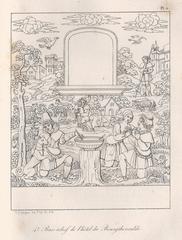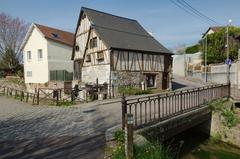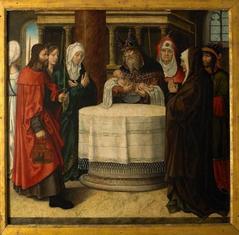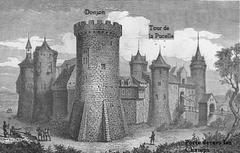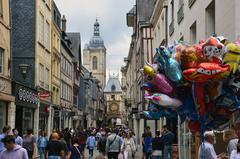Lycée Pierre-Corneille Visiting Hours, Tickets, and Guide to Rouen Historical Sites
Date: 14/06/2025
Introduction
Located in the heart of Rouen, France, the Lycée Pierre-Corneille is both a leading educational institution and a distinguished historic monument. With origins dating back to 1593, the lycée is celebrated for its Renaissance and Baroque architecture, illustrious alumni, and its role as a symbol of French intellectual and cultural heritage. This guide presents a detailed overview of the lycée’s history, architectural highlights, visiting hours, ticketing, accessibility, and practical travel tips. Whether you are a history enthusiast, architecture lover, or planning a cultural trip to Normandy, the Lycée Pierre-Corneille offers a unique perspective on French educational and artistic traditions (Mapcarta, Le Parisien, Official Lycée Website).
Table of Contents
- Introduction
- History and Origins
- Architectural Significance
- Notable Alumni
- Educational and Cultural Heritage
- Practical Visitor Information
- Legacy and Influence
- Frequently Asked Questions
- Conclusion
- References
History and Origins
Founded in 1593 as the Collège de Bourbon by Jesuits under Cardinal Charles de Bourbon, the Lycée Pierre-Corneille was created to provide rigorous Catholic education to Rouen’s youth. Its early curriculum centered on classical languages, philosophy, and theology. The renowned dramatist Pierre Corneille, who later gave his name to the lycée, was among its first students.
The institution underwent significant changes following the suppression of the Jesuits in 1762 and the secularization efforts of the French Revolution. Under Napoleon’s educational reforms, it became a lycée in the early 19th century, reflecting the shift toward secular, meritocratic education in France (The Freelance History Writer).
Architectural Significance
Renaissance to Baroque
The Lycée Pierre-Corneille’s campus showcases a harmonious blend of Renaissance and Baroque architecture. Its original buildings, constructed with brick and stone, feature elegant arcades and spacious courtyards designed for scholarly contemplation. The Chapelle Saint-Louis (now the Auditorium de Normandie) is a focal point, with its Baroque interior—soaring vaults, intricate woodwork, and stained glass windows—standing as a testament to Jesuit ecclesiastical design (In Situ).
Chapelle Saint-Louis / Auditorium de Normandie
Completed in 1631, the chapel has survived wars and threats of demolition thanks to determined preservationists. Today, it serves as a premier concert venue, renowned for its acoustics and innovative “sceno-acoustic sphere.” Adaptive reuse of this chapel for cultural events exemplifies the lycée’s ongoing role in Rouen’s cultural life (In Situ).
Cour d’Honneur and Pierre Corneille Statue
The ceremonial courtyard, or cour d’honneur, features a statue of Pierre Corneille and epitomizes the French ideals of order and educational excellence (In Situ, Fig. 5).
Restoration and Heritage
Recognized as a national heritage site, the lycée has benefited from extensive restoration, preserving its architectural legacy while accommodating modern educational and cultural needs. Major renovations from 2018 to 2023 modernized facilities such as the Joyeuse building, auditorium, and science center, ensuring continued stewardship of its rich heritage.
Notable Alumni
The lycée’s legacy is reflected in its list of distinguished alumni, including:
- Pierre Corneille – Playwright, founder of French classical tragedy.
- Gustave Flaubert – Author of “Madame Bovary.”
- Guy de Maupassant – Influential short story writer and novelist.
- Maurice Leblanc – Creator of Arsène Lupin.
- Eugène Delacroix – Renowned Romantic painter.
- Jean-Baptiste Corot – Celebrated landscape artist.
- Charles Nicolle – Nobel Prize-winning physician.
- André Maurois – Noted biographer and essayist.
Their contributions to literature, science, and the arts highlight the lycée’s profound impact on French and European culture.
Educational and Cultural Heritage
From its Jesuit roots to its modern incarnation, the Lycée Pierre-Corneille has played a central role in shaping intellectual life in Rouen and beyond. Its rigorous academic standards, embrace of Enlightenment values, and commitment to both tradition and innovation have established it as a cradle of French educational excellence. The lycée also participates in the preservation and celebration of Rouen’s cultural life through academic competitions, concerts, and international exchanges, notably with Norwegian institutions since 1918 (Normandie Lovers).
Practical Visitor Information
Visiting Hours and Tickets
- Lycée Access: As an active educational institution, regular public access is not permitted. However, the lycée opens its doors during special events such as the European Heritage Days (Journées du Patrimoine) and selected cultural festivals (Official Lycée Pierre Corneille Website).
- Chapelle Corneille / Auditorium de Normandie: Open during scheduled concerts and events. Tickets are required for performances and can be booked online or at the venue. Access during Heritage Days is typically free but may require advance registration.
- Guided Tours: Occasionally available during open days; check event schedules and book in advance if possible.
Accessibility
While recent renovations have improved accessibility, some historic areas may still present challenges for visitors with mobility impairments. The auditorium is wheelchair accessible for events; consult the lycée or event organizers for specific accommodations.
Travel Tips and Getting There
- Location: 4 rue du Maulévrier, 76000 Rouen.
- Public Transport: The site is easily accessible via Rouen’s Astuce bus network and is about a 10-minute walk from Rouen Rive Droite train station.
- Parking: Limited availability in the historic center; public transport is recommended.
- Dining and Amenities: Numerous cafés, restaurants, and shops are within walking distance in Rouen’s city center.
Nearby Attractions
- Rouen Cathedral (Cathédrale Notre-Dame de Rouen): Iconic Gothic masterpiece.
- Musée des Beaux-Arts: Renowned art museum featuring works by Delacroix and Corot.
- Gros Horloge: Historic astronomical clock.
- Maison natale Pierre Corneille: Birthplace museum of the playwright.
- Musée national de l’Éducation: Exhibits educational history, including artifacts from the lycée (Normandie Lovers).
Photography
- Exterior: Photography of façades, courtyards, and the chapel is encouraged.
- Interior: Allowed during open events but may be restricted during concerts or performances. Always check event rules.
Legacy and Influence
The Lycée Pierre-Corneille is a living testament to centuries of French education and culture. Its alumni have left indelible marks on literature, science, and the arts. The site itself is a vibrant hub for cultural events and academic excellence, maintaining a dynamic relationship with Rouen’s museums and educational institutions. Its layers of history, from Jesuit beginnings to modern innovation, offer visitors a profound appreciation of France’s intellectual traditions.
Frequently Asked Questions (FAQ)
Q: Can I visit Lycée Pierre-Corneille any time?
A: Regular public access is not available. Visits are possible during special events, concerts, or European Heritage Days.
Q: Are tickets required?
A: Tickets are required for concerts and cultural events in the chapel. Heritage Days typically offer free access with prior registration.
Q: Is the site accessible for people with disabilities?
A: The auditorium is wheelchair accessible; other areas may have limited access. Please check in advance for specific needs.
Q: How do I get there?
A: Use Rouen’s Astuce public transport, walk from Rouen Rive Droite station, or use city center parking.
Q: Can I take photos?
A: Yes, exterior photography is encouraged. Interior photography is subject to event guidelines.
Q: What else is nearby?
A: Rouen Cathedral, the Musée des Beaux-Arts, Maison natale Pierre Corneille, and the historic Old Town are all within walking distance.
Conclusion
The Lycée Pierre-Corneille is a cornerstone of Rouen’s cultural and architectural heritage. While general public access is limited, its participation in heritage events and concerts opens rare windows into its storied past. Combine your visit with nearby attractions for a comprehensive Rouen experience, and enhance your trip with tools like the Audiala app for guided tours and event updates.
For current visiting hours, tickets, and event information, always consult the official Lycée Pierre-Corneille website and local tourism resources. Immerse yourself in the rich tapestry of French history, education, and culture at this extraordinary site.
References and Further Reading
- Visiting Lycée Pierre-Corneille in Rouen: History, Architecture, and Visitor Information, 2025, (Mapcarta)
- Visiting Lycée Pierre-Corneille in Rouen: Hours, Tickets, and Historical Insights, 2025, (Le Parisien)
- Visiting Lycée Pierre-Corneille in Rouen: Hours, Tickets, and Historical Insights, 2025, (In Situ)
- Visiting Lycée Pierre-Corneille in Rouen: A Historic Educational Monument and Cultural Landmark, 2025, (Official Lycée Pierre Corneille Website)
- Lycée Pierre-Corneille Visiting Hours, Tickets, and History: A Guide to Rouen’s Historic Landmark, 2025, (Rouen Tourist Office)
- Pierre Corneille - French Playwright, 2013, (The Freelance History Writer)
- Normandy Lovers - Visit 1 Day Rouen Itinerary, 2025, (Normandie Lovers)
- Normandie Tourisme - Rouen Unmissable Sites, 2025, (Normandie Tourisme)
- Audiala App - Guided Tours and Event Notifications, 2025, (Audiala App Download Page)
